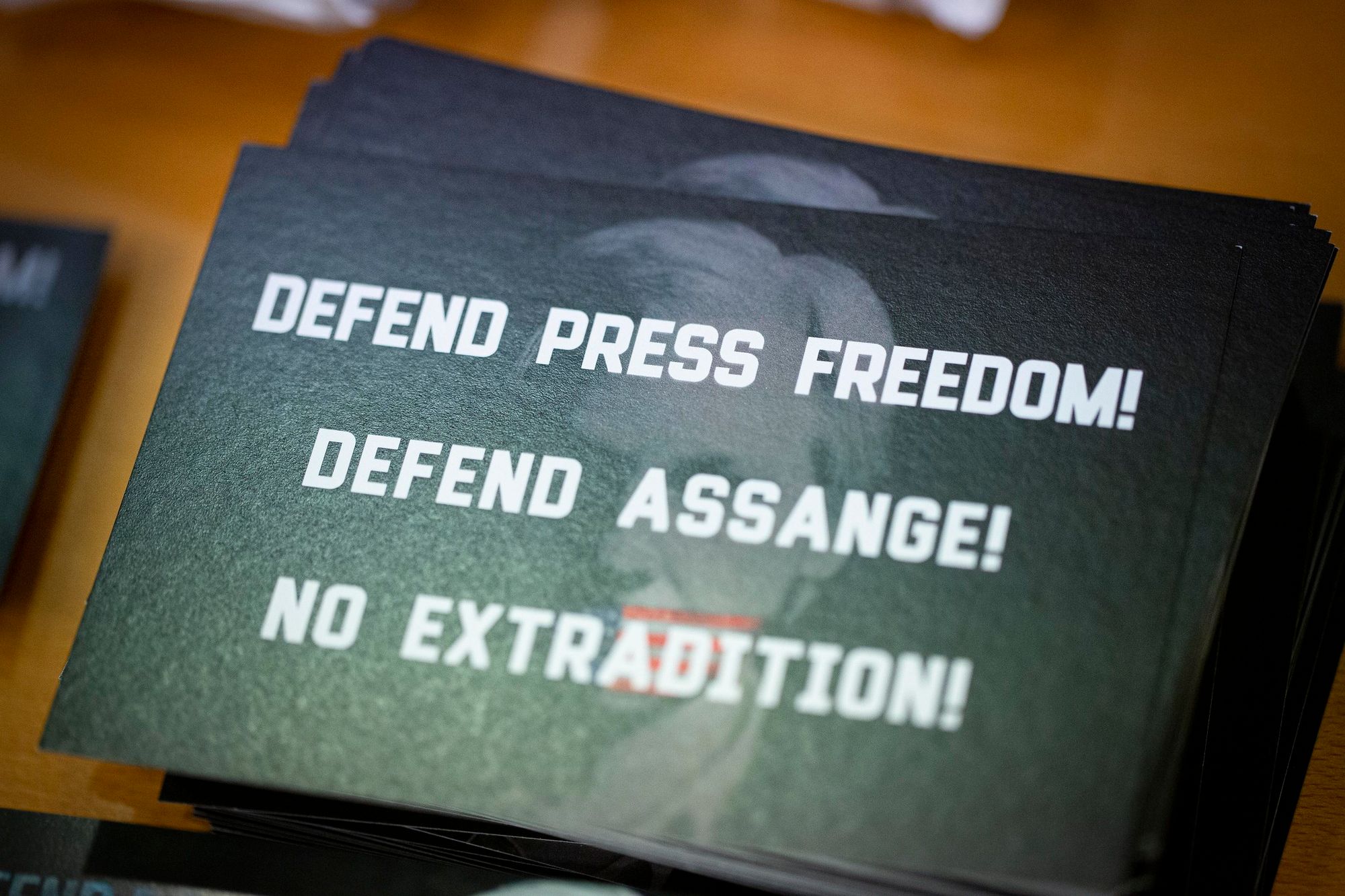The Old Bailey is a sombre, imposing structure in the heart of London. Crowning the courthouse is a dome with a golden statue of Lady Justice at its peak, a sword aimed heavenward in her right hand, a scale in her left. She presides over ground with a long and squalid history, once the site of a prison that counted Oscar Wilde and John Milton among its inmates, and that held countless executions.
Following months of delays as COVID-19 rampaged through Britain, this austere facility is now home to a legal proceeding with enormous, world-spanning implications. The accused is WikiLeaks founder Julian Assange, who faces charges over his role in publishing sensitive material, released by United States Army whistleblower Chelsea Manning, which provides prima facie evidence of crimes of state by the U.S. and its allies. The charges, which include having allegedly tried to help Manning conceal her identity online, and possession and distribution of state secrets, carry a potential cumulative sentence of 175 years.
According to Assange’s partner Stella Moris, guards at Britain’s most notorious modern-day penitentiary, Belmarsh Prison, rouse and strip-search him before dawn each day in preparation for his court appearances. For the last six months, Assange has spent the bulk of his time isolated in his cell, afforded little to no contact with the outside world, unable to access his writings and other documents or even meet his lawyers. When Assange is brought into the courtroom he’s forced to sit behind bulletproof glass, obstructing his ability to follow the proceedings or confer with the defence.
Assange, however, isn’t the only one on trial: we are too. At stake are some of the most basic rights we cherish.
If the prosecution succeeds, Assange will be the first journalist or publisher convicted under the U.S. Espionage Act of 1917, passed shortly after the country’s entry into the First World War by a state determined to clamp down on dissident activity at home. Moreover, Britain, Sweden, Ecuador and Australia’s complicity in Assange’s plight foretell Washington leveraging its international clout and network of alliances to capture non-American journalists and whistleblowers, like a spider ensnaring prey in its web.
That Assange is not American, and was not in the U.S. at the time of the relevant publications, is a declaration by Washington of its readiness to prosecute anyone, anywhere, who exposes its misdeeds or otherwise causes it embarrassment — indeed, that’s effectively what the prosecutors in the extradition hearings are now arguing.
Thus far, proceedings have appeared favourable to the defence, owing to a powerhouse cast of witnesses who’ve vouched for Assange. The prosecutors have resorted to ad hominem attacks on the defence witnesses, with little success. Nonetheless, there’s no guarantee Assange will escape an unfavourable ruling, especially as the presiding judge has authorized extradition in 96 per cent of cases. No matter the decision, an appeal by the losing side is almost guaranteed; the wheels of injustice will grind on.
The present hearings are the latest iteration of an ordeal that began in 2010, when WikiLeaks published three major caches of material, much of which exposed U.S. machinations and misdeeds. The disclosures include diplomatic cables, the Iraq and Afghanistan War Logs, and prima facie revelations of torture and other war crimes. The most infamous exposure, the Collateral Murder video, shows a U.S. helicopter crew gunning down Iraqi civilians, including a pair of Reuters media workers, and then a team of paramedics who responded.
That same year, the Barack Obama administration covertly empaneled a grand jury to investigate WikiLeaks in the Eastern District of Virginia, noted for its draconian commitment to protecting state secrecy privileges and punishing espied violators.
Yet what would prove more damaging to Assange in the court of public opinion was a parallel sexual misconduct inquiry launched in Sweden during his visit in August that year. Assange denies wrongdoing, and although Swedish prosecutors purported to seek him for questioning for years, they never formally indicted him. Contrary to press reports, there have never been “rape charges.” And contrary to popular opinion, Assange didn’t take refuge in Ecuador’s London embassy to avoid facing justice in Sweden, but rather to avoid onward extradition to the U.S.
There are ample grounds for dissatisfaction with the Swedish inquiry, including the fact that both he and his accuser were deprived of their day in court. However, fault for this lies not with Assange, but rather with prosecutors in the U.S., United Kingdom and Sweden.
Assange remained in Sweden for weeks after the accusations arose, and when he eventually left the country, did so with prosecutors’ permission. For years, he offered to submit to questioning and return to Sweden on the condition that Stockholm guarantee against onward extradition. Alternatively, U.S. officials might have publicly denied any intention to prosecute him. These requests weren’t fulfilled, prompting Assange and his legal team to challenge the Swedish extradition request. Among their concerns was Sweden’s unprincipled participation in the CIA’s extraordinary rendition program. It’s now self-evident that their reticence was justified.
Having lost this legal battle and exhausted his appeals against extradition to Sweden, Assange applied to Ecuador for political asylum in June 2012. The government of then-president Rafael Correa assented, satisfied that Assange was a target of political persecution.
For close to seven years, the British government refused to grant Assange safe passage to Ecuador as international law requires. Instead, they maintained a constant police presence outside the embassy, at great expense to the British public, waiting for Assange to emerge into their vise-like grip. It was a modern siege. Indeed, a United Nations working group ruled in 2016 that Assange was being arbitrarily detained by Sweden and the U.K.
E-mails obtained in a freedom of information request by Italian journalist Stefania Maurizi suggest Swedish prosecutors were inclined to drop the sexual inquiry far earlier than they did, but their British counterparts pressured them to keep it going. “Don’t you dare get cold feet!” warned one such message to Swedish head prosecutor Marianne Ny in 2012.
Sweden repeatedly opened, dropped, re-opened and then re-dropped its preliminary investigation. Despite a suspension of the inquiry in May 2017, Britain never withdrew the corresponding bail-jumping charge that Assange incurred while taking refuge in the embassy. It was this “offence” for which Assange was arrested and hauled out of the building in April 2019 after a new Ecuadorian president nullified both his asylum and citizenship.
Assange’s initial period of incarceration was an exceptionally severe penalty for a minor infraction, particularly considering that half the time was to be served in Belmarsh; bail infractions in Britain typically attract a fine. Departing from normal judicial decorum, the sentencing jurist scolded Assange as “a narcissist who can’t get beyond his own selfish interests.” With the period of incarceration set to expire in September 2019, Judge Vanessa Baraitser, who is now overseeing the extradition hearings, ordered that Assange remain behind bars indefinitely lest he “abscond” in “these proceedings.”
Assange has been subjected to one grotesque abuse of his rights and procedural fairness after another, each sufficient to trigger dismissal of any normal criminal case.
For much of his time in the Ecuadorian embassy, Assange and his associates, including journalists, were spied on by a Spanish security company Ecuador hired to surveil the premises. In a lengthy exposé, journalist Max Blumenthal revealed links between the firm, the CIA and one of President Donald Trump’s chief political patrons, casino magnate Sheldon Adelson. The snooping included surveillance of Assange’s otherwise confidential and privileged conversations with his lawyers, and even an attempt to retrieve his infant son’s DNA from a discarded diaper with the aim of verifying his paternity. Ecuador unlawfully surrendered many of Assange’s personal effects to the U.S. government as well.
The liberal press has been fiercely, and often unjustly, critical of WikiLeaks since the 2016 publication of emails procured from the servers of Democratic officials, exposing the rigging of the 2016 primary and other details that embarrassed the party and Hillary Clinton.
Affluent liberals and neoconservatives, who dominate the American press, remain consumed with allegations that Russia hacked the documents and funneled them through WikiLeaks to interfere in the election on Trump’s behalf. Never mind that: Assange denies any collusion with Russia; no public evidence has yet been adduced suggesting such a relationship, or even proving Russia poached relevant emails; a journalist has a duty to publish factual information in the public interest regardless of its source; the electorate has a right to be informed. The reactionary proposition these figures endorse is that voters should have gone to the polls in 2016 in a state of ignorance.
This animus toward Assange and WikiLeaks is clearly shared by Trump’s administration. Unlike his predecessor in office, who declined prosecution of Assange over the “New York Times problem”— meaning the impossibility of distinguishing WikiLeaks’ investigative and journalistic activities from those routinely conducted by legacy news organizations — Trump has pressed ahead, seeking to destroy Assange and WikiLeaks. Trump has also radically escalated a long-term politicization of the U.S. judiciary by appointing an attorney general, William Barr, who subscribes to the doctrine of the unitary executive, which places prosecutorial decisions at the president’s sole discretion.
The Assange prosecution is the most dangerous threat Trump poses to freedom of the press. But you wouldn’t know it from the lack of fanfare about the case and its virtual absence from the public agenda, even in the U.S.
Official statements defending Assange in Canada are extraordinarily rare. With the notable exception of Green Party leadership contestant Dimitri Lascaris, progressive politicians in our country seldom address the issue. Most Canadians seem to misperceive that Assange’s case holds no relevance for us. Nothing could be further from the truth.
A successful prosecution of Assange would set a formal precedent that no one in the world who possesses or makes unauthorized disclosures of sensitive U.S. government information is safe. In fact, the case has already established an informal precedent, with Assange suffering a seemingly never-ending gauntlet of politically motivated lawfare, detention and defamation. Indeed, there’s a considerable risk that he could die before his prosecution ever draws to a conclusion — if not from the cumulative neglect of nagging medical conditions for which he has been denied proper treatment, then perhaps from COVID-19.
The Assange case also invites both democratic and authoritarian regimes to escalate repression and intimidation of journalists who reveal secrets of their own and allied governments. In recent months and years, member states of the western power alliance, including France, Australia and the U.K, have intensified efforts to punish disclosures of state secrets in the public interest.
Canadians have no reason to imagine ourselves immune to this trend. Nor can we rely on our own government to protect us from a flimsy, politically motivated extradition request by an allied state, as evidenced by the detainment of Huawei executive Meng Wanzhou at the Vancouver International Airport in December 2018.
The purpose of that prosecution, as Trump himself has all but admitted, is to sabotage a highly advanced Chinese telecommunications firm in hopes of preserving U.S. supremacy in the 21st-century digital economy. Canada never should have made itself complicit in that sordid affair. Now that it is, hawkish officials and press commentators in our country are using the apparent retaliatory detentions in China of Michael Spavor and Michael Kovrig to rationalize Ottawa’s refusal to free Meng.
Canadian leftists may harbour resentments toward Assange for various reasons, some legitimate. But our assessments of his character, favourable or otherwise, are irrelevant under present circumstances — as are frequent claims, often emanating from an elitist press corps, that he is “not a real journalist.” Journalism is an activity rather than a licenced profession; journalists who imagine themselves as part of a privileged, protected class independent of the rabble hold a dangerous illusion about their legal position. Moreover, Assange’s character and his professional bona fides are not on trial at the Old Bailey. The charges he faces instead describe actions that are normal, fundamental practices of investigative journalism.
The right of Assange or any other journalist to solicit and publish information mirrors the right of citizens to be informed. Without the latter, democracy itself becomes hollow and meaningless, and there can be no public accountability for a state that operates, tortures and kills in secrecy. This is why leftists throughout the world bear a duty to both oppose Assange’s extradition and demand his freedom, using the largest bullhorn we can find.







Member discussion